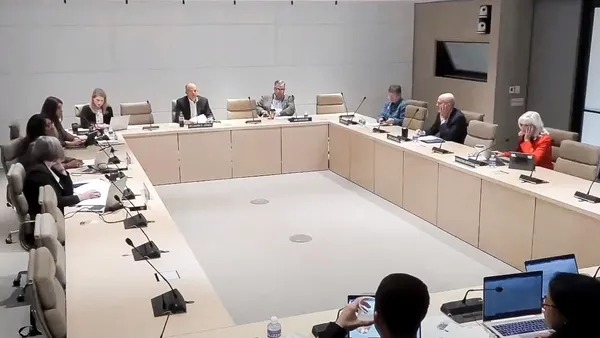Dive Brief:
- The Federal Reserve, FDIC and OCC are asking banks to transition away from U.S. dollar London Inter-bank Offered Rate (LIBOR) as a rate-setting vehicle as soon as possible.
- New financial contracts should use a reference rate other than LIBOR, or have fallback language including an alternative reference rate after LIBOR’s discontinuation, the regulators said in a November 30 statement.
- The Fed directed banks to use any reference rate they feel is appropriate for their funding model and customer needs.
Dive Insight:
LIBOR has been the go-to since the mid-1980s for most commercial and consumer loans. It's also been the main rate for structured products, contractual agreements, derivatives, corporate securities, floating rate instruments and benchmarked instruments.
Regulators began calling for a transition away from LIBOR after the 2008 financial meltdown, as credibility concerns mounted.
In the U.S., one of the rates expected to replace it is the Secured Overnight Financing Rate (SOFR). In the E.U., the preferred replacement is expected to be the Sterling Over Night Index Average (SONIA).
U.S. and European Union regulators are officially replacing LIBOR at the end of 2021, but yesterday's joint statement from the Fed, FDIC and OCC makes clear they want banks to start transitioning now to get ahead of expected administrative headaches and legal liability for businesses.
"Given consumer protection, litigation, and reputation risks, the agencies believe entering into new contracts that use USD LIBOR as a reference rate after December 31, 2021, would create safety and soundness risks," the statement said. "The agencies encourage banks to cease entering into new contracts that use USD LIBOR as a reference rate as soon as practicable and in any event by December 31, 2021."
If the LIBOR administrator extends the publication of USD LIBOR beyond December 31, 2021, the agencies say, there may be limited circumstances when it would be appropriate for a bank to enter into new USD LIBOR contracts after that date:
- Transactions executed in a central counterparty auction procedure in the case of a member default.
- Some market making activity executed before January 1, 2022.
- Transactions that hedge USD LIBOR exposure of a bank or bank client on contracts entered into before January 1, 2022.
- Novations of USD LIBOR transactions executed before January 1, 2022.
"This statement should not be read as announcing that the LIBOR benchmark has ceased," the statement says, "or will cease, to be provided permanently or indefinitely." But, the regulators add, "the LIBOR transition is a significant event that poses complex challenges for ... the financial system."













